Table of contents
- Letter from the Board
- Modelica Association
- Conferences and user meetings
- Vendor news
- orchideo | easySSP X-Mas Edition
- Simcenter Webapp Server 2020.2 released
- Simcenter Amesim 2020.2 released
- Enhanced Debugger in OpenModelica 1.16.2
- OpenModelica 1.16.2 Release
- Modelon 2020.2 Released
- Modelon Impact: Lowering Barriers and Bridging Gaps
- Dymola 2021x
- 3DExperience Systems Simulation Designer
- News from libraries
- Education news
Letter from the Board
Dear Modelica, FMI, SSP, DCP interested,
at the Modelica Association Annual Meeting 2020 a new MA board was elected, as it is regularily done every two years. The new MA board is the same as in the previous two-years period with the following exceptions:
-
The Vice-Chairperson Peter Fritzson resigned. Peter was one of the founders of the Modelica Association and had this position from the beginning. Martin Sjölund from Linköping University was elected as new Vice-Chairperson. Since many years, Martin has contributed to the design of the Modelica language and the OpenModelica environment.
-
The MA project leader Thomas Beutlich and the deputy project leader Dietmar Winkler of the MA project Modelica Libraries resigned from their positions after several years of extensive work on the Modelica Standard Library leading finally to the new major MSL version 4.0.0. These positions are currently vacant, because no one applied to them. Until a new project leader is elected, the MA Chairperson (Martin Otter) is temporarily leading this project. If you are interested in one of these positions, please contact Martin Otter.
The operations of the Modelica Association will most likely grow in 2021. Currently, there are plans that two new Modelica Association Projects will be established next year. More details will be given, when formal decisions have been made.
Note, you can follow the development of Modelica Association activities on github, in particular for the Modelica language - version 3.5, and for FMI - version 3.0.
Despite the worldwide Coronavirus pandemic, it was possible to organize two Modelica Conferences in 2020, both as pure online conferences:
-
The American Modelica Conference 2020 (Presentations - click on “Watch video” or inspect on Youtube, Single papers and slides, Proceedings at Linköping University Press), and
-
The Asian Modelica Conference 2020 (Proceedings at Linköping University Press).
We are very happy that this worked out quite well, and we will try to improve upcoming conferences, based on this experience, and hopefully improved Web-tools.
In 2021, the International Modelica Conference will take place in Linköping, Sweden on Sept. 20-22. The conference is planned as a hybrid event - so both presenters as well as participants can either join physically, or remotely. Depending on the situation of the Coronavirus pandemic, the conference might also be changed to a pure online conference, if this is necessary. Note, the call-for-papers page is open and you are encouraged to submit full scientific papers and/or extended abstracts for industrial user presentations. Final deadline for the submissions is April 26, 2021.
If you have interesting news for the Modelica, FMI, SSP and DCP communities, please follow the submission guidelines. The deadline for articles for the next newsletter is Fr. April 16, 2021.
Martin Otter on December 14, 2020
Chairperson of the Modelica Association
This article is provided by Martin Otter (Modelica Association)
Modelica Association
FMI news
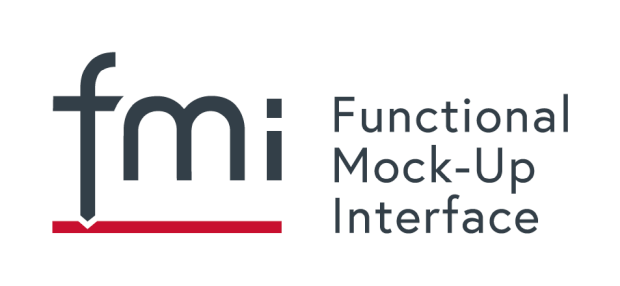
Updated Cross-Check-Rules
The FMI Steering Committee has passed an updated version 4.1 on the FMI Cross-Check Rules, which includes the following changes:
- The FMI Steering Committee revised its decision to introduce fees for listing in the FMI Cross-Check tables: there will be no listing fees for Cross-Check results.
- The FMI Steering Committee decided to reduce the required proof for import results to the self-assessment passed/failed files. This will help reduce the space requirements for the Cross-Check repository without practically reducing the quality of the results. Existing result files for importers will be removed by the project factotum without further notice.
Online FMU Checker
There is a prototype of a new online check of FMUs available, see fmi-standard.org/fmu-check/. FMU Check performs a static analysis of the FMU that validates the following aspects:
- validity of the modelDescription.xml w.r.t. the XML schema
- uniqueness and validity of the variable names
- completeness and integrity of the Model Structure
- availability of the required start values
- combinations of causality and variability
- definition of units
It does not check the following aspects:
- validity of the binaries
- validity of the sources
- any non-standard files inside the FMU
- execution of the binaries / simulation of the FMU
This new online FMU Check is based on FMPy, a Python library by Dassault Systèmes to validate and simulate FMUs that has a graphical user interface, compiles C code FMUs and generates CMake projects for debugging, see github.com/CATIA-Systems/FMPy The online FMU checker complements the checking of FMUs with FMPy or the FMU Compliance Checker, a command line tool based on the FMI Library developed by Modelon AB to validate and execute FMUs.
Maintenance release FMI 2.0.2
The FMI project is planning a maintenance release FMI 2.0.2 with bugfixes and introducing the /extra directory in FMI 2.0 (already there in SSP, and to come in FMI3.0). The release process has started, voting in the FMI Steering Committee and Modelica Association has been initiated. The release candidate is and the released version will be available here, where also the changes are listed.
FMI 3.0
You can follow the development of FMI 3.0 on Github and inspect the latest development version here.
FMI User Meeting at the International Modelica Conference 2021
At the International Modelica Conference in Linköping, Sweden on Sept. 20-22, there will be an FMI user meeting, as part of the Industrial User Presentations on the first day. If you are interested to give a presentation, please find more information in the Call for Industrial User Presentations.
This article is provided by MAP FMI
Conferences and user meetings
14th International Modelica Conference
| The 14th International Modelica Conference will be a hybrid remote and physical event, held at the concert and conference hall in Linköping, September 20–22, 2021. It is organized by Linköping University, in cooperation with the Modelica Association. Join us in Linköping in person or from the comfort of your own home. |
Call for Papers
The Modelica Conference will cover modeling of complex physical and cyber-physical systems as well as tools, for a wide range of research and industrial applications. The Modelica Conference is the main event for users, library developers, tool vendors and language designers to share their knowledge and learn about the latest scientific and industrial progress related to Modelica and to the Functional Mockup Interface (FMI). More information is found on the conference page.
You are encouraged to submit a full paper until April 26, 2020. Every submitted paper will be reviewed by 3 reviewers. More details about the calls for papers, libraries, user presentations and vendor presentations, exhibitors, sponsors.
We are looking forward to seeing you in Linköping.
Contact
For general questions, please send an email to: modelica2021@groups.liu.se
Conference Chairs
- Main contact: Lena Buffoni, Linköping University
- Lennart Ochel, RISE Research Institutes of Sweden AB
Program Chairs
- Martin Sjölund, Linköping University
- Adrian Pop, Linköping University
This article is provided by Adrian Pop (Linköping University)
OpenModelica/MODPROD Workshop 2021
Call for participation for the OpenModelica workshop and the MODPROD workshop on model-based cyber-physical product development. The OpenModelica workshop is concerned with tooling and applications of OpenModelica, whereas the MODPROD workshop covers general cyber-physical system modeling and system development using multiple tools and formalisms. Several tutorials will be given including topics such as Modelica and FMI.
The workshops are organized in cooperation between LIU, ICES, INCOSE Sweden and IEEE Computer Society Swedish Chapter
Location: online
Participation free of charge.
- 13th OpenModelica Annual Workshop, February 2, 2021
- 15th MODPROD Workshop on Model-Based Cyber-Physical Product Development, February 3-4, 2021
Theme for this year: Digital engineering for a resource efficient and circular industry
Keynotes for MODPROD2021 Workshop:
- Lisen Schultz, Deputy Director of Transdisciplinarity at the Stockholm Resilience Centre. “A Resilience Perspective on Sustainability Transformations”
- Andreas Junghanns, Senior R&D Engineer at Synopsys. “FMI - Current Challenges, Trends and Developments”
- Richard Romano, Professor at University of Leeds, Chair in Driving Simulation. “Model based design of Automated Vehicles”
- Claes Nord, Senior Visitor Experience Specialist at AB Sandvik Coromant. Title to be announced.
For more information, registration and previous workshops see www.modprod.se and www.openmodelica.org.
This article is provided by Lena Buffoni and Lennart Ochel Open Source Modelica Consortium
Report from American Modelica Conference 2020
The American Modelica Conference 2020 was held in a virtual format from September 22-24, 2020 and was a distinct success as the first virtual Modelica conference. Twenty two papers and fifteen user presentations were delivered at the conference on a variety of theoretical and applied topics, ranging from the Modelica language and tools to mechanical, power, thermofluid, and aerospace applications. Mark Jennings from Ford and Chris Gearhart from the U.S. National Renewable Energy Laboratory (NREL) provided keynote addresses related to model-based development for automotive applications, and the virtual format also provided a venue to hold new “Birds-of-a-feather” sessions in which the conference attendees could participate in roundtable discussions about a variety of forward-looking topics relating to the Modelica language and FMI. Six free online workshops on a variety of subjects related to Modelica were also provided on dates either immediately before or after the conference, and were uniformly well-attended.
Perhaps most significantly, the new virtual format provided a new means for the conference to connect with attendees across the globe. While the majority of the 231 attendees were from the United States and Canada, many attendees from Sweden, Germany, and the UK, among other countries, also participated in the conference. This global reach benefited all of the attendees and the discussion at the sessions due to the wider variety of perspectives and experiences that could be shared. In addition, the collection of recorded materials for the virtual conference also made it possible to archive these presentations for the future, and all of the talks and presentations are now available on the North America Modelica Users’ Group YouTube page, while the proceedings and presentation files are also available on the persistent event site from the link at modelica.org.
We are grateful for your participation in the conference, and look forward to seeing you at the next conference in 2022!
Chris Laughman, on behalf of the board of the North America Modelica Users’ Group
This article is provided by Chris Laughman (Mitsubishi Electric Research Laboratories)
Vendor news
orchideo | easySSP X-Mas Edition
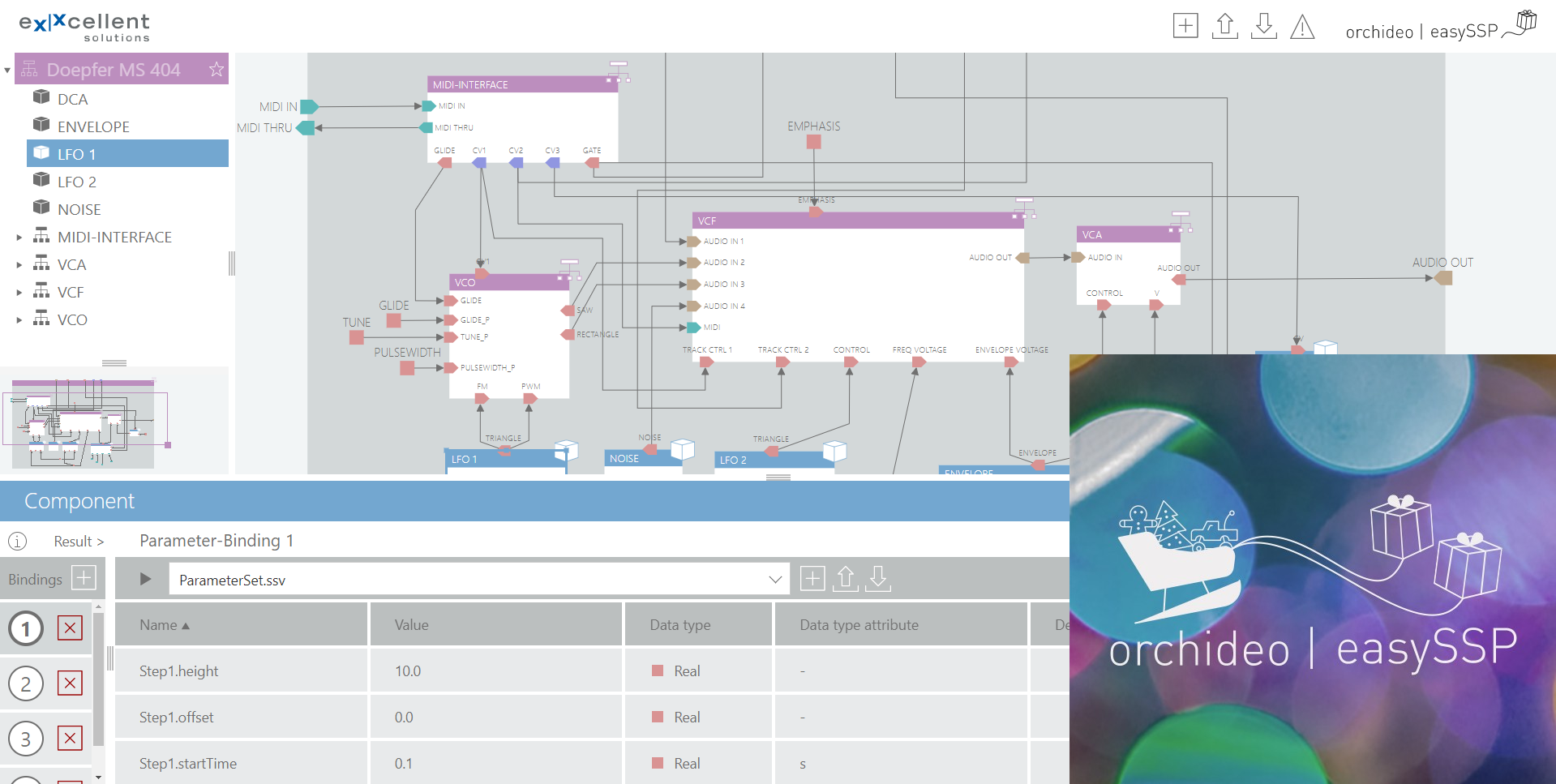 The X-Mas Edition of orchideo | easySSP is now available at easy-ssp.com.
The X-Mas Edition of orchideo | easySSP is now available at easy-ssp.com.
X-Mas Edition
orchideo | easySSP is a cloud-based and easy-to-use editor for Modelica’s SSP (System Structure & Parameterization) standard, which brings benefits like consistent simulation architecture design, effortless collaboration & component integration, easy system validation and tool-independent simulation to the table, which leads to faster simulation development cycles and high quality results.
Right in time for Christmas, a special X-Mas Edition of orchideo | easySSP is available, to bring a little Christmas spirit into your simulations.
Get started
The current version of orchideo | easySSP comes with advanced graphical modelling features like magnetic snap and quick navigation, easy import of FMI 2.0 components, extended model parameterization through parameter bindings and sets, reuse of SSP models through model references and “special features” like the support of Open Simulation Interface (OSI) connectors for autonomous driving.
New features are continuously added with every new release. Soon orchideo | easySSP will support cloud-based simulation of SSP models.
orchideo | easySSP is free and no installation is required. Check out easy-ssp.com and start leveraging the benefits of SSP!
Contact us at easy-ssp@exxcellent.de
This article is provided by Gregor Hermann, Peter Lobner eXXcellent solutions
Simcenter Webapp Server 2020.2 released
Siemens Digital Industries Software is proud to announce the recent release of Simcenter Webapp Server 2020.2. We can highlight the following key features:
- A new interface for administrators to manage the user simulations
- Branding customization
- A new full featured web-based table editor
- Possibility to share a model to a group of users and not only to single users
- New scripts to upgrade from a previous version of Simcenter Webapp Server
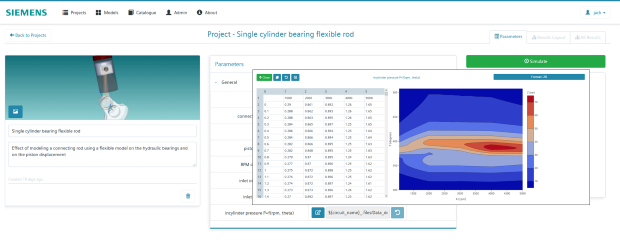
For more information on Simcenter Webapp Server, please visit our website.
This article is provided by Anthony Domi (Siemens Digital Industries Software)
Simcenter Amesim 2020.2 released
Siemens Digital Industries Software is proud to announce the recent release of Simcenter Amesim 2020.2, as part of its system simulation solutions. Among the key features introduced in this release, we can highlight the FMI and Modelica related improvements below.
Modelica updates
As announced in the previous issue of this newsletter, the Modelica Editor has been extended with the following capabilities:
- Modelica Compiler (Modelon’s Optimica Compiler Toolkit) upgraded to version 1.18
- Extended variable filtering capabilities for the simulation: black-box and wildcard character support
- Increased translation logging usability
FMI updates
A new ONNX to FMI conversion tool has been introduced. It allows exporting FMUs from ONNX files containing neural networks (surrogate models) generated by Simcenter Amesim itself, using the Neural Network Builder tool, or coming from other ONNX compatible software. The generated FMUs comply with version 2.0.1 of the specification and support the following advanced capabilities:
- Capabilities common to model exchange and co-simulation
- Save and reload model states
- Multiple instantiation
- 32-/64-bit Windows/Linux binaries
- Source-code provided (unique C file)
- Documentation including ONNX graph
- Initialization via start values and/or inputs
- Model exchange specific capabilities
- Generation of FMUs with or without event handling
- Co-simulation specific capabilities
- Variable-step co-simulation (for static neural networks)
This new tool represents a first step towards the deployment of highly portable lightweight but accurate representations of physical models — executable digital twins — on a wide variety of targets (e.g. IIoT, Edge Computing or Cloud platforms), to serve various kinds of simulation contexts and purposes.
More will come in the next Simcenter Amesim releases with the end of the EMPHYSIS European project from which Siemens Digital Industries Software is a member, and with the future release of FMI 3.0 to which Siemens also actively contributes.
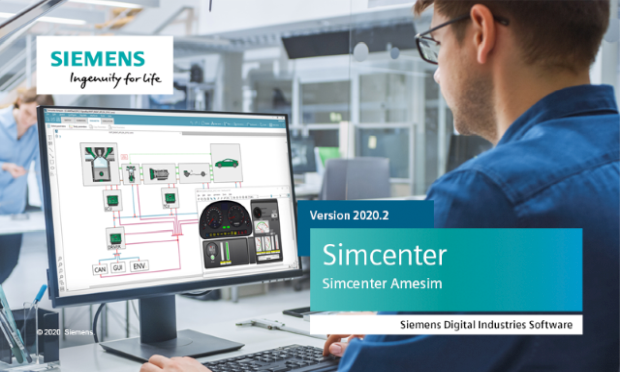
For more information on Simcenter Amesim, please visit our website.
This article is provided by Bruno Loyer (Siemens Digital Industries Software)
Enhanced Debugger in OpenModelica 1.16.2
The equation model debugger in the recent OpenModelica 1.16.0 release and in the 1.16.2 bugfix release is enhanced with new functionality to help the user understand sources of model errors.
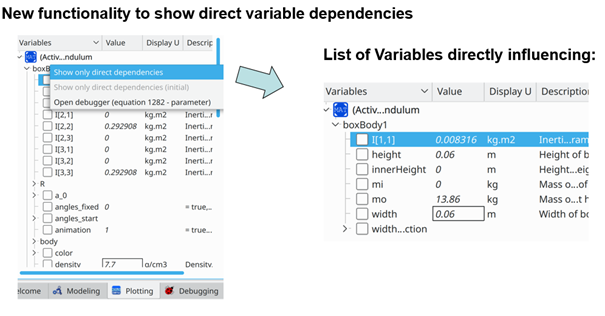
The figure shows the debugger tracing how variables or equations influence a variable.
Left: Turn on the menu choice. Right: List of variables directly influencing the chosen variable.
The new functionality allows the user to perform a “backward” trace of which variables or equations that directly influence a chosen variable (see figure). This can be useful to understand the dependencies causing a faulty variable value.
See www.openmodelica.org for download.
This article is provided by Martin Sjölund Open Source Modelica Consortium
OpenModelica 1.16.2 Release
OpenModelica is the only actively maintained complete open-source Modelica-based cyber-physical mathematical modeling, simulation and optimization environment intended for industrial and academic usage. Its long-term development is supported by a non-profit organization–the Open Source Modelica Consortium OSMC with many company, institute, and university members.
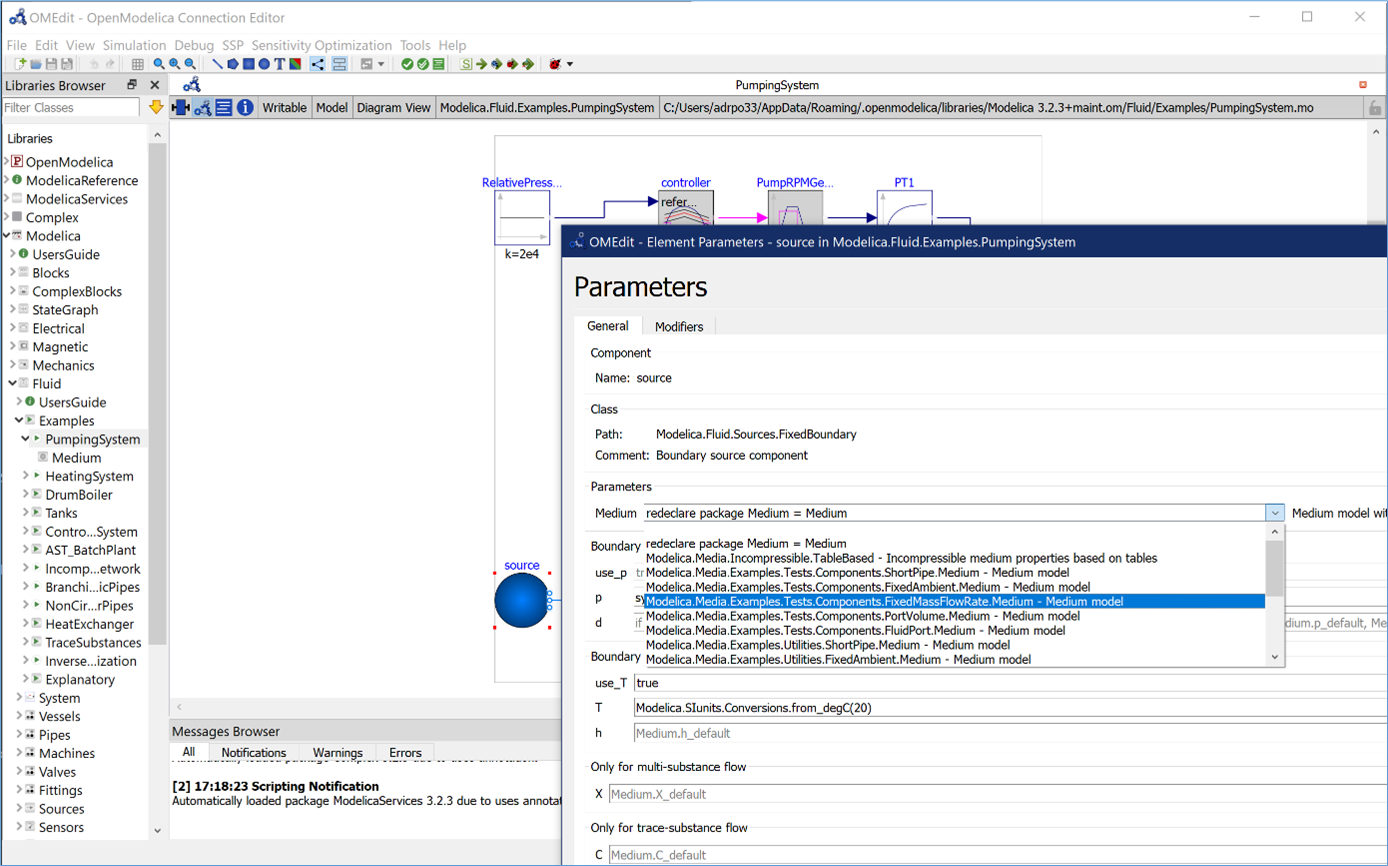
The figure shows OpenModelica while editing Modelica.Fluid component parameters, using the replaceable GUI.
OpenModelica 1.16.2 has been released. This is a bug fix release to the recently released OpenModelica 1.16.0, primarily to improve the stability of the OMEdit GUI. The main enhancement in the 1.16.0 release (see release notes) is the graphical user interface support of replaceable items in libraries. The new frontend has been further improved with enhanced support of records and arrays. The new front-end can now handle 100% of the Modelica Standard Library 3.2.3 models. Also improvements to backend and simulation run-time regarding homotopy, CVODE solver included, new minimal tearing, better support for models with records, enhanced OpenModelica debugger that can show direct variable dependencies, a full-fledged Modelica package manager is included, initially available via the command line interface, and more.
Further improved FMI support in OpenModelica OMSimulator: GUI: text editing of SSP models, undo/redo functionality, delete components, etc. FMI/CoSimulation 2.0 now includes CVODE solvers and customization via simulation flags. SSP 1.0 is supported. See www.openmodelica.org for download.
This article is provided by Peter Fritzson Open Source Modelica Consortium
Modelon 2020.2 Released
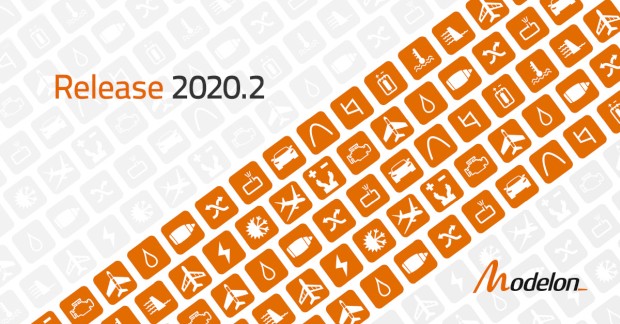
Modelon is pleased to announce the 2020.2 release is now available for Modelica libraries within the Modelon Library Suite. As part of our multi-platform strategy, select Modelon technology is available in an expanding list of platforms. View the complete list here.
2020.2 Highlights
Automotive
- Added capability to deploy Vehicle Dynamics Library vehicle models in VI-Grade’s eco-system of driving simulators
- Improved cyclic battery aging models, new electric vehicle model range example
- Support for sequential transmissions
- New thermal expansion valve, improvements in gas mass calculations, flow source connections user friendliness connection improvements
Aerospace
- Physics-based Solving technology implemented into Jet Propulsion Library enhancing steady-state simulation, documented in a new tutorial on specific Turbojet example
- New bend models with examples, new Ejector in Fuel System Library
- Improved user friendliness by restructuring ambient models and multi-pressure boundary connectors
- Single acting cylinder model, improved cavitation, mixing and friction models in Hydraulics Library
Energy & Power
- Microgrid demonstrator (model, notebooks, web apps) – complete workflow
- Thermal Power Library significantly modernized (structure & calc. stability) with several new components and examples related to hydrogen combustors, economizer calibration, heat recovery steam generator design and water steam cycle calibration
- Spline-based Table-lookup Media Creator
- New capillary Tube model, two-phase-gas counter-flow heat exchanger for residential AC
To access the new release, contact our team.
This article is provided by Kenzie Maurice (Modelon)
Modelon Impact: Lowering Barriers and Bridging Gaps
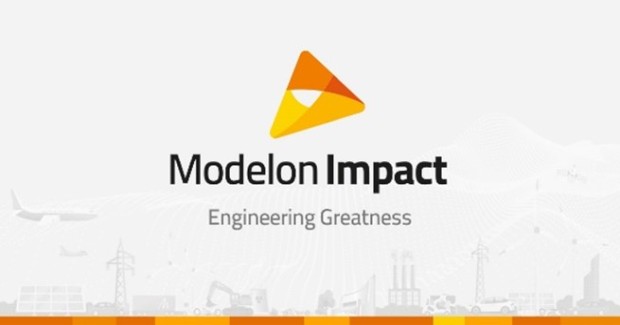
Modelon Impact is an open, cloud-ready, collaboration-friendly multi-domain modeling platform. It is built on the open standards of Modelica, and unified under a single user interface that teams can use across an entire organization. Every department across an entire organization can collaborate and co-develop from the start, implicitly relying on the same “single-source of truth,” and thus reducing miscommunication, last-minute-fixes, and busy work. We are proud to offer this modern user experience and it is simply the beginning – we’re just getting started.
Learn more: www.modelon.com/modelon-impact-introduction/
Modelon also offers a free on-demand webinar Modelon Impact Introduction providing an overview and demonstration of Modelon Impact.
The second on-demand webinar Aerospace System Design with Modelon Impact offers an overview and demonstration of Modelon Impact as the solution for implementing model-based design methods and digital thread.
This article is provided by Kenzie Maurice (Modelon)
Dymola 2021x
We are delighted to announce that Dymola 2021x is available. Find presentation and release notes here
Editing and user interface
Importing FMU code modules is common. It is now possible to precisely control which FMU signals should be exposed or hidden, making the interface easier to use. When drawing diagrams, connections can be automatically routed to avoid existing components. On popular request, Dymola can be run in “dark” mode for a new experience.
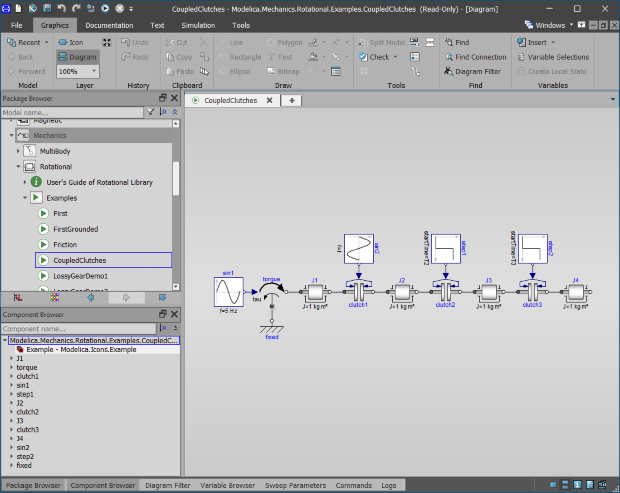
Simulation
Static simulation (initialization) has become up 2x faster for many common types of models. To help understand the model’s behavior, equation systems can be visualized with an incidence graph.
Model libraries
The Modelica Standard Library 4.0.0 is the default in Dymola 2021x. Automatic conversion scripts are applied when opening models that used MSL 3.2.3. The new Aviation Systems Library models propulsion and aerodynamics of fixed-wing and rotary-wing aircraft.
This article is provided by Dag Brück (Dassault Systemes)
3DExperience Systems Simulation Designer
Systems Simulation Designer is a new web based tool available now on the DASSAULT SYSTEMES Cloud.
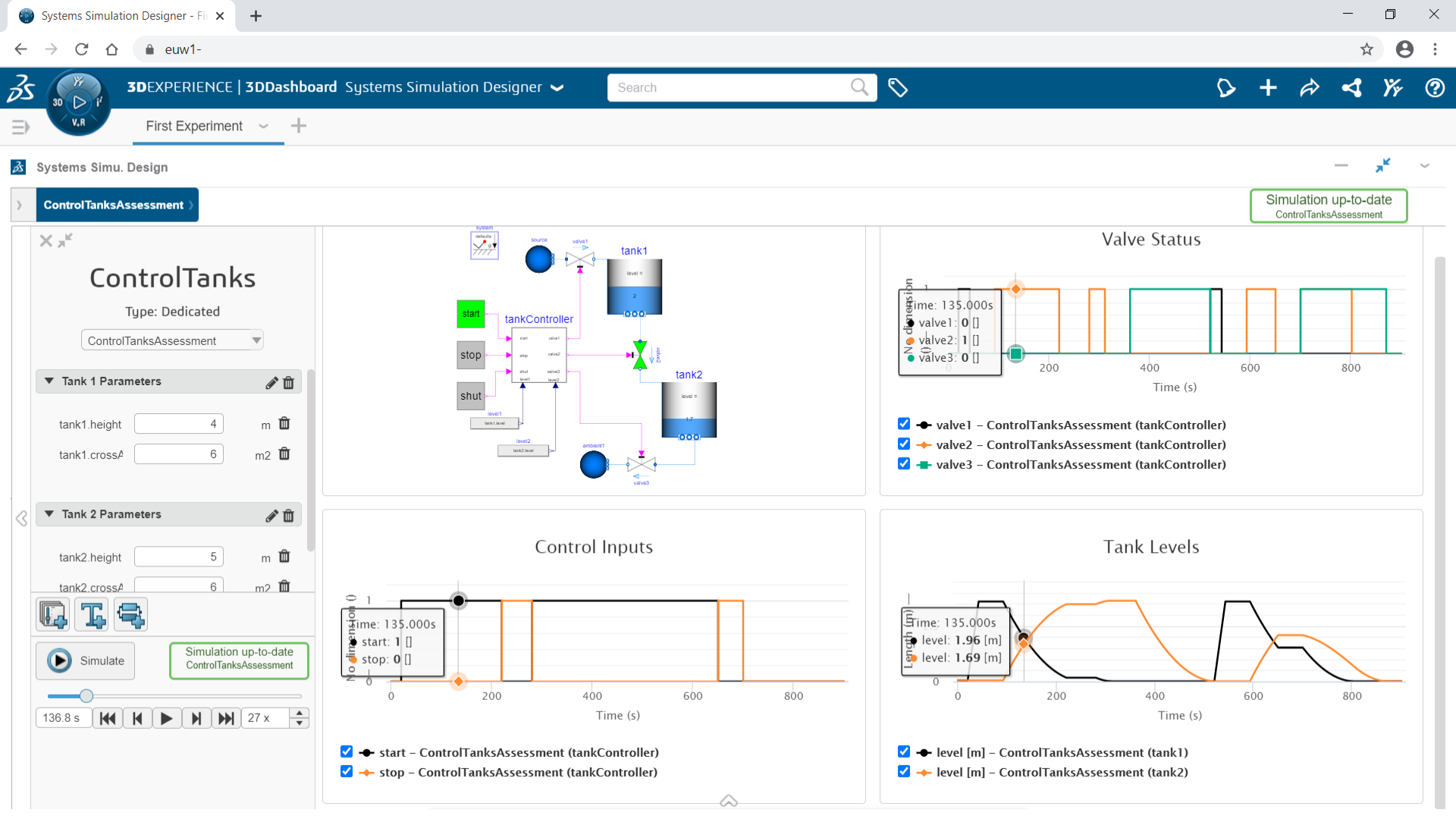
The goal of this new tool is to allow domain experts to create multi-physics simulation models using Modelica libraries and share ready-to-use experiments in the overall company for systems assessment and tradeoff analysis:
- Fast deployment without software installation accessible from a web browser
- Compose a model based on existing libraries
- Modelica modeling flexibility, including changes to structural parameters and redeclaration of models and components
- Setup all the pre and post processing to simplify the models for other users. For example, defining parameter ranges, creating a list of important parameters for a dedicated model, defining important plots
- Create a simulation cockpit or simulation dashboard, which is a simplified view of the simulation with parameters, animation and results available in a single page
- Provide fast model execution using the DASSAULT SYSTEMES cloud computing
- Distribute knowledge of simulation based on Modelica
This article is provided by Alexandre Cortina (Dassault Systemes)
News from libraries
TLK TIL Suite - New version 3.9.1

The TIL Suite is a comprehensive Modelica library for stationary and transient simulations of thermodynamic systems.
Besides the TIL release the following models are available in add-on packages:
- A tumble dryer model including tumble dryer drum and heat pump cycle with e.g. propane.
- Polynomial compressor models with 10 coefficients according to the EN12900 or AHRI 540 standard.
- PCM storage with phase-change material to store thermal energy (heat or cold).
- Air-to-air heat exchangers with a fin and fin geometry and e.g. humid air with condensation.
In the current TIL version 3.9.1 are improvements in compressor, moist air cell and gas valve models among other things. Detailed information are listed in the Release Notes.
For further information see www.tlk-thermo.com, download the TIL presentation or contact us at til@tlk-thermo.com.
This article is provided by Ingo Frohböse TLK-Thermo GmbH
New Motorbike module added to VeSyMA suite

VeSyMA - Motorbike was introduced to satisfy the multi domain simulation needs of the motorcycle industry. The current capabilities range from energy consumption to driveability and performance analysis and cover all powertrain possibilities including ICE, hybrid and electric. Read the complete article here

This article is provided by Mahdieh Mehrabi (Claytex)
Aviation Systems Library
The new Aviation Systems Library (ASL) offers models for the aerodynamic behavior of aircrafts like airplanes or multi-copters. It uses standard MSL physical connectors to allow the design of propulsion systems with other libraries like the Electrical Powertrains Library (EPTL) considering the effects of the flight mission on the performance. Being fully integrated into the MSL MultiBody environment, all potential of Modelica libraries can be utilized. In this first release, two main topics are covered:
- Longitudinal dynamics of airplanes (fixed-wing) for designing a propulsion system considering the flight mission
- Full dynamics of multi-copter drones (rotating-wing) including the control system for mission planning and design of the propulsion system The two areas share common models like propulsion or landing gear systems. Components of the electric drive are structured in a reasonable way to allow replacing by custom drive systems from other libraries:
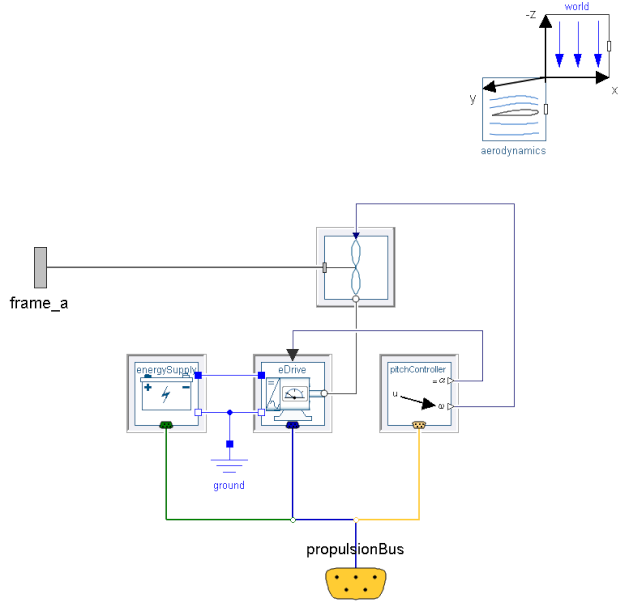
The aerodynamic forces of wings or propeller blades are calculated by table-based profile polar curves. Geometrical arrangement of the aerodynamic objects to model an aircraft is conducted in the Modelica MultiBody environment. A simple tire model allows take-off from ground and landing:

This article is provided by Maximilian Kormann (Dassault Systèmes Deutschland GmbH)
Education news
Claytex technical blog

Claytex publishes a technical blog covering all things Modelica and Dymola. Selecting from the latest posts:
- Stability of explicit Euler solvers
- A few more Dymola translation modifiers
- Dymola Python Training
- Effective Modelica Library Development
- Reducing Non-Linear Systems with Filters
- Modifying evaluated parameters in multiple simulations
- License free deployment
- Supplying an inverse to a function
- The Dymola Translation Log
This article is provided by Mahdieh Mehrabi (Claytex)
